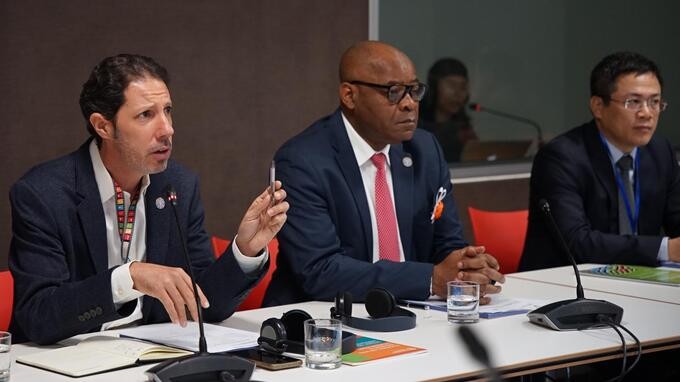- Giới thiệu
- Nhóm Công tác
- Tin tức
- Thông tin về FTA
- Tài Liệu
- Sự kiện
- Liên hệ
Digital transformation of agriculture cannot exclude land data
Soil health is under a lot of pressure under the fact that Vietnam is the world's leading agro-product exporter.
Lacking accurate assessment and data concerning soil health
To ensure soil sustainability and health, serving the goals of agroecology and sustainable food systems, the development of a system to monitor activities related to soil health is required. This content was emphasized at the kick-off meeting "Support for the development of the national soil health strategy and action plan" recently held in Hanoi.

Pierre Ferrand, Agricultural Officer, Technical Consultant, FAO Regional Office for Asia and the Pacific
Soil health is facing great challenges in Vietnam such as acidification, salinization, reduced organic matter content, erosion, landslides, and many more serious problems, especially in vulnerable areas. Cultivation activities and intensive farming in some areas have exhausted nutrients and micronutrients in the soil. This is also one of the sources responsible for pollution to plant health. In addition to subjective factors, soil health is also affected by other objective factors such as population growth, modernization, and urbanization, which require a lot of land use change and affect the environment. large to the extent of forest cover, vegetation.
Pierre Ferrand, Agricultural Officer, Technical Consultant, FAO Regional Office for Asia and the Pacific raised the issue. “These processes take place both openly and quietly, but there is not yet an assessment or official data which help us see to what extent the soil is affected. There is also a lack of an appropriate system to accurately monitor the effectiveness of land and cropland management measures in terms of soil quality and health improvement.”
The FAO representative also noted that the current soil-related data had not been updated regularly, some data was outdated while information related to soil management and planning processes for land use remained limited. This was also considered a limitation for Vietnam to meet international commitments.
Integrating soil health-related content into agroecological projects
In addition to the impacts of climate change, soil health is under a lot of pressure in the current context as Vietnam is the world's leading agro-product exporter of a variety of commodities such as rice, coffee, and pepper. Information from the Department of Crop Production, Ministry of Agriculture and Rural Development (MARD), shows that the total area of annual crops in Vietnam is 10.8 million ha, of which 4.2 million ha are short-term crops on sloping land which is severely affected by erosion. The delta of 5.7 million ha is affected by pollution, especially in industrial parks and residential areas and this area is the prime object of increasing emissions, especially due to rice cultivation.
As agriculture holds a certain role and responsibility in the land use process, Le Van Duc, Deputy Director of the Department of Crop Production (MARD), said that the soil assessment program required the active participation of the Ministry of Agriculture and Rural Development and the Ministry of Natural Resources and Environment. This was a proposal from the agricultural sector in contributing to amending the Land Law. “We find that in the period of the market economy, soil was paid little attention because enterprises were more interested in trading fertilizers and pesticides. Meanwhile, there is no strategy on soil health, and the training of human resources in the soil sector has not been focused," said Mr. Duc.
According to Dao The Anh, Deputy Director of the Vietnam Academy of Agricultural Sciences (VAAS), the issue of soil health is an integrated and interdisciplinary issue. Playing the role of coordinating and promoting the agricultural sector's ecological transformation, the unit has contributed to the development of the Action Plan for Sustainable Food System Transformation, in which the protection of natural resources, including agricultural land, is a matter of priority.
“It can be said that agricultural land is a precious resource of Vietnam because the land is limited while the population is large. Apart from ensuring food security for more than 100 million people, Vietnam is also a food exporter. Therefore, we need to re-evaluate the importance of soil health to ensure sustainable food production and security,” said VAAS Deputy Director Dao The Anh.
Tin liên quan
PSAV Attends the 30th Anniversary Celebration of Cargill Vietnam2025/10/23
Plant health management helps increase coffee yield up to 15%2025/10/16
An Giang to host 2025 OCOP forum for sustainable development2025/09/25
Viet Nam and France foster cooperation on blue economy and sustainable environment2025/09/29
Agriculture and Environment exhibition ready for National celebration2025/08/27



 Điều lệ hoạt động
Điều lệ hoạt động



















































